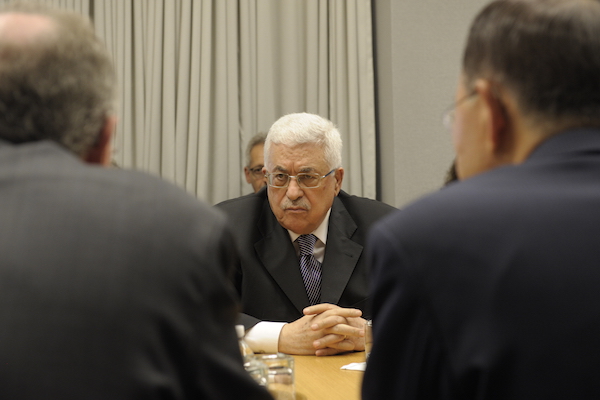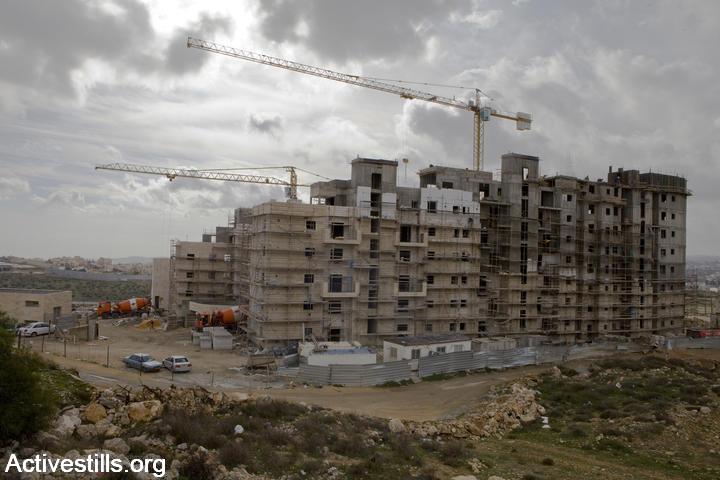Palestine’s accession to the International Criminal Court is an official declaration of lawfare, a new battleground in the conflict with Israel; settlements will be the thorniest legal issue in the courtroom (if it ever gets there).
By Lolita Brayman

Palestinian President Mahmoud Abbas’ signing of the Rome Statute is a game changer for the Israeli-Palestinian conflict. Following the disappointment of the UN Security Council’s (UNSC) vote on a resolution to end Israeli occupation – a two year plan to establish a sovereign Palestinian state and end the conflict – the Palestinians turned to other international bodies for diplomatic relief. Acceding to the International Criminal Court (ICC) may be more of a strategic, political move than a legal one, but the risky decision now shifts the decades-long conflict justly into a court room. Lawfare is a new battleground of negotiating dynamics in a changing, volatile Middle East region.
After formally delivering ICC accession papers to the United Nations, Permanent Observer of the State of Palestine to the UN Riyad H. Mansour said that Palestinians were seeking justice through “peaceful and civilized legal options,” specifically for the victims of Israel’s Operation Protective Edge in Gaza and policies regarding settlements in the West Bank and East Jerusalem.
The legal battle that may ensue is a welcome transformation for some, who believe that the U.S. negotiations-only policy has reached a dead-end; for others it is a grave tragedy. With formal accession to the ICC, the court acquired broad jurisdiction over war crimes, crimes against humanity and acts of genocide on Palestinian territory. The Palestinians also submitted an Article 12(3) declaration requesting retroactive jurisdiction starting on June 13, 2014, covering operations Brothers Keeper in the West Bank and Protective Edge in Gaza.
In three months, ICC Prosecutor Fatou Bensouda will have the authority to request a full investigation into the situation in Palestine. But as a matter of ICC policy, she will more likely announce a preliminary examination. This process is likely to go on for months, maybe years, and does not guarantee a formal investigation. But either way, it will make headlines.
Settlements: Law or politics

If retroactive jurisdiction is permitted, the actions of both parties in the recent Gaza war, including the targeting and killing of civilians, will be included in an investigation. But the issue of settlements is a more complex legal matter and could potentially lead to the prosecution of Israeli officials.
According to the Rome Statute and several central instruments of international law that predate it, Israel’s settlements could be considered a war crime. Under the Fourth Geneva Convention it is unlawful for an occupying power to transfer parts of its own population into the territory it occupies, therefore any measure designed to expand or consolidate settlements in the West Bank is prohibited.
In 2010, the Assembly of States Parties, the legislative body and plenary organ of the ICC, added the crime of aggression to the ICC’s jurisdiction – another way settlements and the occupation itself could be brought before the court. The military occupation or annexation — of another state’s territory — by force is considered a crime of aggression, as is a blockade of ports or coasts. Israel’s annexation and control of East Jerusalem, the Golan Heights, and restrictions on Gaza’s maritime border could be deemed illegal under this new mandate. However, such crimes cannot be formally considered or prosecuted until 2017, when jurisdiction for the crime is scheduled to enter into force.
Not only do the settlements pose thorny legal questions, they are also political issues that require a definition of borders, a topic that legal scholars are hesitant to touch. Official international bodies, including the UN General Assembly and the International Court of Justice (ICJ), agree that the pre-1967 borders established by the 1948 UN Partition Plan make up Palestine’s territorial boundaries. But the language of later legal instruments was drafted with future peace talks in mind and they acknowledge that boundaries could change through land swaps. “In other words,” wrote David Laban, an international criminal law expert, “all these documents leave the exact path of the boundary line to be determined by politics, not by international lawyers.”
In August 2014, ICC prosecutor Fatou Bensouda herself commented on the current politics v. legality discussion. She explained that the ICC lacked jurisdiction to open an investigation (at that time) because Palestine had not yet accepted the court’s jurisdiction (it now has). She reaffirmed that the court will exercise its mandate to “vigorously pursue those – irrespective of status or affiliation – who commit mass crimes that shock the conscience of humanity.”
One important, but subjective question at stake is whether Israel’s policy of settlement building “shocks the conscience of humanity.” But a more practical question is whether the ICC is equipped to handle such a decision in the first place, considering the debate on borders has no solidified legal precedence.
Israel could protect its state actors from prosecution over its West Bank settlement policy by internally investigating their actions. Complementarity in the Rome Statute is defined by jurisdictional terminology: a state’s leaders or official actors may only be prosecuted if it can be shown that the state is “unwilling or unable” to carry out a genuine investigation and prosecution of the alleged war crime. Unlike military investigations into soldiers’ actions and crimes, however, there is no Israeli legal body that has a mandate or desire to investigate the illegality of Israel’s settlements —building settlements, after all, is state policy. To date, the Israeli High Court of Justice has avoided ruling on the legality of settlements, perhaps inadvertently keeping the door wide open for international prosecution.
Israeli leaders have a choice at this juncture and instead of condemning Palestine’s ICC bid, they could benefit by looking inwards and establish a complementarity defense. More than ever, there is now an incentive to do so: resolving the issue of settlements in the political arena before legal adjudication shows the ICC that Israel is serious about adhering to international law.
Consequences of international lawfare

Lawfare can be dangerous because it runs the risk of state and non-state actors becoming more hostile under the international spotlight of diplomatic theater. This is where the ICC can be used for more for political manipulation than actual justice redress – the symbolism of the ICC’s involvement has ramifications. Though Palestine faces sanctions and financial cuts from the U.S., Israel risks seeing a serious setback to its international legitimacy and ability to combat the Boycott, Divestment and Sanctions (BDS) movement.
Daniel Reisner, an international law expert and former head of the Israel Defense Force’s International Law Department, said in an interview that he considers the Palestinian ICC bid a belligerent act within the framework of the non-physical and kinetic world of lawfare. “Lawfare will push us ever closer to a multiple-front conflict,” Reisner continued, citing Netanyahu’s harsh, yet predictable reaction to the ICC bid as an example. “Israel’s response – to withhold the transfer of funds which were supposed to be recovered by the Palestinians under the Oslo Agreements – is generating an increased brinksmanship-response (“we will dissolve the PA”) from the Palestinians,” he said.
Most international law analysts agree that the timing of the ICC move will not advance Palestinian statehood in the near future. According to The Lawfare Institute, Palestine’s “lose-lose-lose move” will empower political forces in Israel most opposed to compromises on Palestinian ambitions.
Only time will tell whether the ICC move will lead to productive reconciliation results, but the sudden reliance on international law is emblematic of the changing geopolitics of the Middle East. The Israeli-Palestinian conflict is no longer a top priority — it is becoming an international nuisance. The politics of the Security Council vote illustrates this changing landscape: Jordan and other Arab countries pushed the resolution because they need to close the Palestinian issue and divert their attention inward against extremism.
Sometimes brinksmanship can force parties to compromise and with Israeli elections looming, and no real expectation for a new peace initiative anytime soon, lawfare might make the conflict a little more transparent. A change in venue just might be the battleground that moves the process forward. It is surely better than stalemate.
Lolita Brayman is a lawyer and former editor at Haaretz.com with an M.A. in conflict resolution and mediation from Tel Aviv University. Follow her on Twitter at @lolzlita.
More on Palestine joining the ICC:
Palestine’s ICC bid is only as threatening as Israel makes it
Why Israelis should welcome Palestine’s ICC bid
The world’s obligation to end the occupation
